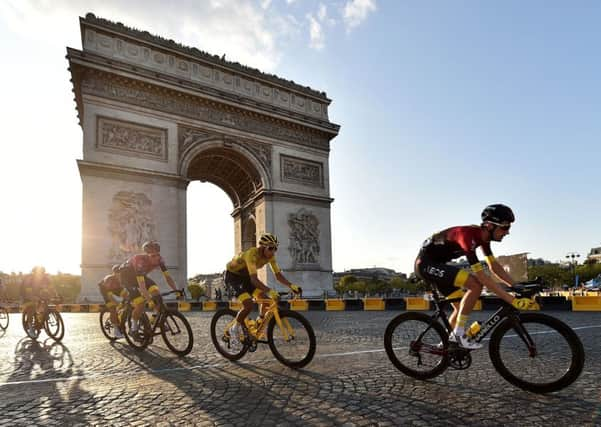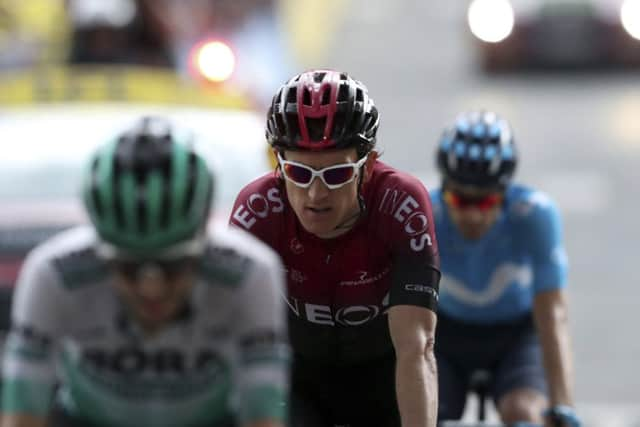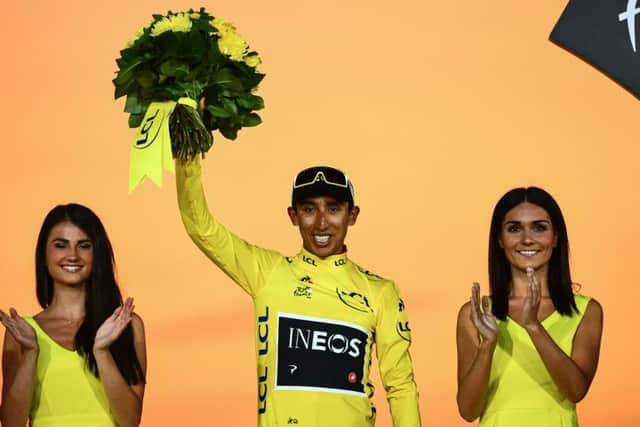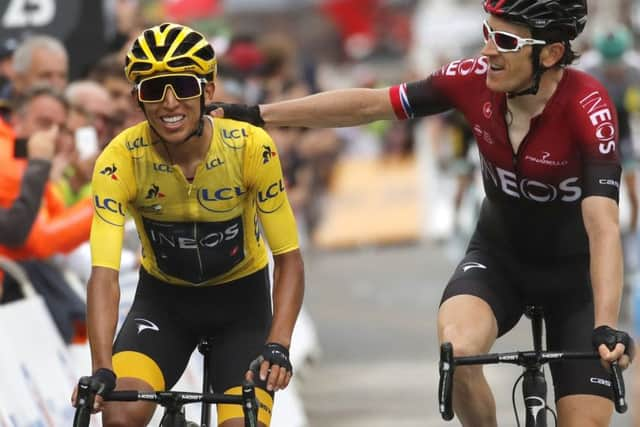Nick Westby – Fear factor played into the hands of Sir Dave Brailsford’s Tour de France Team Ineos heroes


New challengers, heroic home rides, fighting across the handle bars, internal leadership battles, uncertainty, a genuine competition for the general classification, hail storms and mudslides.
Yet at the end of it, the same team stood on the top step of the podium.
Advertisement
Hide AdAdvertisement
Hide Ad

The flag being raised may have changed, the colour of the shirt different, the branding the polar opposite of what the team name once stood for, but the outcome was nevertheless the same as it has been since 2012.
A Tour de France victory for Team Ineos, formerly Team Sky, the expensively assembled but single-minded superpower of elite road cycling.
Egan Bernal became the fourth different rider for the team to win the sport’s most exacting of races, following Sir Bradley Wiggins, Chris Froome and Geraint Thomas, pictured congratulating his team-mate on Saturday.
With Froome winning four times, the team Sir Dave Brailsford built has won seven of the last eight Tours de France, having only entered the race in 2009.
Advertisement
Hide AdAdvertisement
Hide Ad

They are undoubtedly the team of the decade – and with Bernal only 22, probably the team of the next decade, too.
They are the most handsomeley backed financially and their marginal gains are the stuff of legend, taking the sport to new levels of aerodynamic advantages, planning and execution.
But if this most enthralling of Tours has taught us anything, it is that their rivals have learned nothing from the past eight years.
Because if ever there was a time to topple Sky/Ineos, this was it.
Advertisement
Hide AdAdvertisement
Hide Ad

No Froome through injury led to a leadership power struggle between Thomas and Bernal that was there to be exploited by their general classification rivals.
Ineos were not riding for one man as they had in the past, but biding their time until one of Thomas or Bernal emerged as the leader.
It took 19 days of racing and that mudslide in the Alps to determine the young Colombian was the team’s No 1.
By then, one of their rivals should surely have seized the initiative and taken the race for the yellow jersey out of their hands.
But, instead, Ineos’s rivals never stood up to the test.
Advertisement
Hide AdAdvertisement
Hide AdWhy? Because they are paralysed by fear. A fear of challenging. A fear of competing. A fear of watching and learning.
No team has learned the Brailsford way and replicated it.
Sky/Ineos win the Tour de France every year because that is all they care about, winning the general classification. Targeting stage wins is not enough.
Arriving in France with a team built for sprinters is a waste of resource. The only time they did this was in 2012, the year of their first overall victory, when Mark Cavendish was at the peak of his sprinting powers and yet also there to support Wiggins’s bid for victory.
For eight years they have been the best because no rival team has studied what they do, copied it and evolved it in their own image.
Advertisement
Hide AdAdvertisement
Hide AdTwenty-two teams line up at the start of a Tour de France, but too many are merely just happy to be there, to get some exposure for their sponsors.
Too many turn up with the notion that winning a stage represents a successful Tour.
No other team starts the race with such a single-minded intent as that of Team Ineos.
No other team recruits super domestiques and riders built for self-sacrifice on the Alps as aggressively as the British squad.
Advertisement
Hide AdAdvertisement
Hide AdNo other team passes up the pursuit of stage wins for the bigger picture of the maillet jaune, a reward so storied it beggars belief that it does not have more protagonists hellbent on slipping their arms into it.
Contenders have come and gone in the quest to dethrone Froome, Thomas and Bernal.
Vincenzo Nibali is the only one to enjoy success, winning in 2014, but even then it could be argued that was only because Froome withdrew on stage five.
Otherwise, Nairo Quintana has flattered to deceive, Alberto Contador was past his best and now retired, Tom Dumoulin has only recently emerged and Simon Yates has been focused on the other two Grand Tours of Spain and Italy.
Advertisement
Hide AdAdvertisement
Hide AdThibaut Pinot gave it a damn good shot this month, with two thrilling performances in the Pyrenees. Just as it looked like he was ready to pounce, injury struck on the middle day in the Alps.
Even the main man of this year’s Tour, Julian Alaphilippe, could not be considered a genuine threat given his history suggested his strength was as a one-day classics rider.
Alaphilippe is a better bet for the rainbow jersey in Yorkshire in September, not the yellow jersey in France in July.
If the list of contenders over the last three-quarters of a decade seems short, then that is exactly what it is.
Advertisement
Hide AdAdvertisement
Hide AdTeams are not building general classification contenders any more, and if they are, they are not up to scratch.
They are not dutifully supported like the Sky/Ineos leader, not as well prepared for the challenges ahead, and not as well versed in safely negotiating their man through three weeks of racing towards Paris.
The decade began with Britain having never produced a team or a rider to win the Tour de France.
It ends with the sole British squad in the race, whoever the backer, having suffocated the life out of the rest of the competition, eliciting a stranglehold on the race much like the Klitschko brothers did in boxing’s heavyweight division for far too long.
Nobody dared face Vitali or Wladimir. Nobody dare touch Sky, Ineos, Brailsford, Froome, Thomas and now Bernal, no matter what colour the shirt or what flag is raised.
